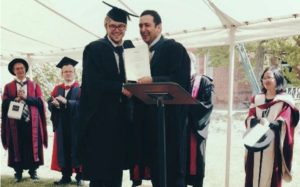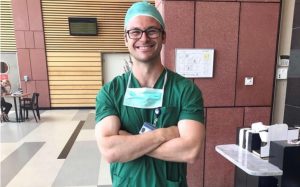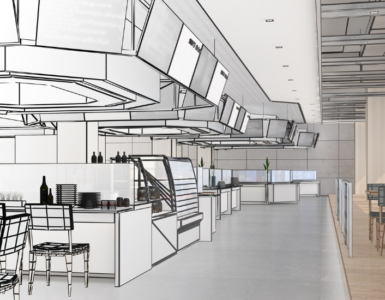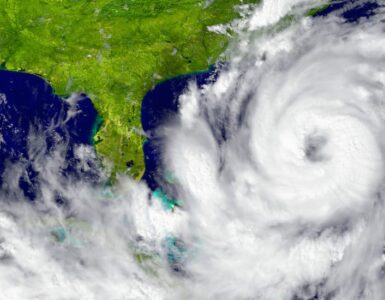When COVID-19 disrupted Dr James Cutlan’s medical degree, he seized the opportunity to start working early for the NHS and join the fight against the pandemic.
James tells CONNECTED how he made the transition from economics at Reading, to a junior doctor working on the frontline of the COVID-19 pandemic, and where his motivation stems from.
Combining economics and medicine
James has always had an interest in both economics and medicine and hopes to combine his two passions in his career. He tells CONNECTED why he chose to study economics at the University of Reading.
 He said: “I studied A-level economics during the 2007-08 financial crisis which meant everything I was learning in the classroom I could directly relate to the world around me. As a result, I decided to pursue an economics degree to further my understanding of both macro and microeconomics. I was attracted to Reading for two main reasons.
He said: “I studied A-level economics during the 2007-08 financial crisis which meant everything I was learning in the classroom I could directly relate to the world around me. As a result, I decided to pursue an economics degree to further my understanding of both macro and microeconomics. I was attracted to Reading for two main reasons.
“One reason was the location – it was not too far from my home in Cardiff, but was also close enough to London for great employability. The other was the choice and variety of optional modules – the economics course at Reading enabled me to explore areas such as financial accounting, econometrics and climate change. It also incorporated both medicine and economics through modules in public economics including health economics and an excellent module in the history of economic thought.
“I really enjoyed my time at Reading and the Department of Economics was fantastic. I threw myself into university life becoming President of the Economics Society, working open days, and developing long-lasting relationships with course mates and my tutors.”
Despite thoroughly enjoying his studies at Reading, James never forgot his passion for medicine and incorporated this where he could.
He said: “The optional modules I studied continued to fuel my interest in medicine, as did my time spent volunteering at the Royal Berkshire Hospital where I had the opportunity to talk to patients about their healthcare journeys in the setting of a large hospital. My personal tutor also helped me pursue my interest in medicine – we discussed what the transition in studies would be like and what skills I had developed at Reading that could help me as a medical student. He also provided my academic reference for my medical school application. He was an incredible support to me and we’ve stayed in touch since.
“I’m really happy I studied economics at Reading before studying medicine at Queen’s University Belfast. I believe that being a graduate gave me a great advantage – I had three years of self-directed study at Reading, of learning to live away from home and understanding how a university works. Economics equipped me with transferable skills such as essay writing, appraising peer reviewed studies and gave me a higher understanding of the statistical component of epidemiology which is something many medical students fear.
“Plus, my economics degree continues to make me think about the bigger picture in healthcare whilst always placing the patient at the centre of it. I really hope to use my two degrees together in my career.”
Working to beat COVID-19
The COVID-19 outbreak overhauled James’ professional life very quickly. James tells us how he’s seeing this as an opportunity and is pleased to be part of the effort to fight the pandemic.
 He said: “Due to COVID-19 my final year assistantship – the final placement of medical school – was cut short by over a month and my graduation was brought forward by three months. In the last few weeks, I’ve been granted my provisional registration with a licence to practise by the General Medical Council [GMC] and had my graduation and reading of the ‘Medical Sponsio Academica’ all via video call! Life has changed very quickly for all of us medical students.
He said: “Due to COVID-19 my final year assistantship – the final placement of medical school – was cut short by over a month and my graduation was brought forward by three months. In the last few weeks, I’ve been granted my provisional registration with a licence to practise by the General Medical Council [GMC] and had my graduation and reading of the ‘Medical Sponsio Academica’ all via video call! Life has changed very quickly for all of us medical students.
“I already had my first job as a doctor in the Royal Glamorgan Hospital lined up to start in August 2020. However, many of the UK’s newly qualified doctors have opted to work early in posts called ‘Foundation Interim Year 1’, which I started in May. This is a brand new job that’s been created because of the COVID-19 pandemic.
“I see graduating early as an opportunity – I personally feel a sense of national duty to use the skills I’ve built up during my five years studying medicine, and three years studying economics at Reading, to help out as much as I can on the frontline. My job primarily focuses on reducing the pressure on the NHS by being an extra pair of hands to support my hospital colleagues.”
Despite his final placement being cut short, James feels prepared to go into the workforce. He tells CONNECTED:
“Towards the end of my studies I was trained in specific medical practices relating to COVID-19, things like how to put on [don] PPE and take off [doff] PPE. It’s actually surprisingly complicated and high risk, so a great deal goes into educating healthcare professionals on how to do it safely. We were also taught on specific aspects of the virus, such as the pathophysiology of how COVID-19 affects the body, and the principles of managing patients who are acutely unwell. I received a lot of help from my university and from healthcare professionals in hospital during placement.
“I am grateful to have the opportunity to use my skills in hospital to help out as much as I can. I feel confident that I’ve been trained in a way that I can keep myself and members of my team safe.
“Many medical students I know have also jumped at the opportunity to help the NHS get through this challenging period. At times like these, we all have to help each other as much as possible.”
Proud to support the NHS
The courage of junior doctors stepping up to help the NHS and the country in its hour of need is truly inspirational. James tells us where his motivation stems from.
“Ultimately my motivation comes from my patients. I want to make a positive difference and get people back to their day to day lives.
“Having the opportunity to care for people at their most vulnerable is a difficult but rewarding responsibility which I’m extremely grateful to deliver. Everyone has been so supportive during the COVID-19 pandemic – it makes me feel proud to be a part of the NHS.”
Find out more about how our Reading graduates are involved in the fight against COVID-19.






